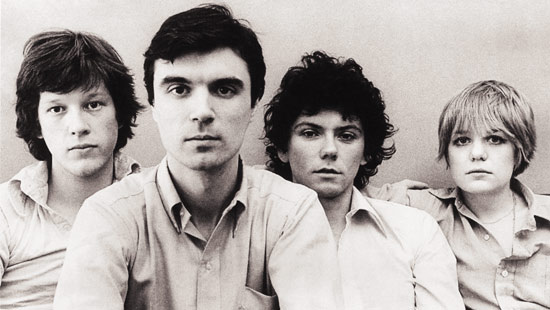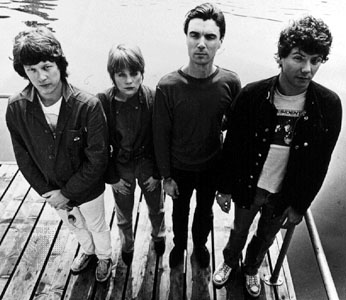–
I think we all need at least one really nice positive thing about the entertainment business every single day of the year, including weekends. Sometimes it may be something simple, like a video that showcases something fun and sometimes it may be a movie poster that embraces the aesthetic we all want Hollywood to aspire to. Sometimes it may be a long-winded diatribe. Sometimes it’ll be from the staff and extended family of CHUD.com. Maybe even you readers can get in on it. So, take this to the bank. Every day, you will get a little bit of positivity from one column a day here. Take it with you. Maybe it’ll help you through a bad day or give folks some fun things to hunt down in their busy celluloid digesting day.
4.4.11
By Damon Houx: Twitter
Talking Heads

But other music is timeless yet still very much a part of who I am, and I’ve surprised myself by never growing tired of band Talking Heads. The band was formed in 1974, and were – as should be suspected – formed out of an art school. The band was David Byrne on guitar and vocals, with Chris Frantz on drums and Tina Weymouth on bass. They were a trio until Jerry Harrison joined the band to add his guitar and keyboard skills (after leaving The Modern Lovers). He joined in 1977, just as they were about to put out their first album.
Talking Heads ’77 is one of those first albums that feels spare, cheap, but that adds to the flavor. It also seems to be huge influence on a generation of musicians that followed. It feels thematically coherent; weird, but not precious. Bands like Arcade Fire and Broken Social Scene and Radiohead (who took their name from a song on the True Stories soundtrack) seem unimaginable without this album. It also gave the band one of their biggest hits – “Psycho Killer.” But from the first song “Uh oh, Love Comes to Town” (which always struck me as influential on “99 Balloons.”) you get a real sense of the band. Funky in a white sort of way, playful, and with world music interests. The band had a way of turning nonsense into the best sort of lyrics. “Who is It?” builds on a series of questions with a great funk riff. It also doesn’t dawdle – it’s a song that runs less than two minutes, and segues into what may be the best song on the first album “No Compassion.”
This is the start of the song’s lyrics:
“In a world / where people have problems. In this world / where decisions are a way of life. Other people’s problems / they overwhelm my mind. They say compassion is a virtue / but I don’t have the time.”
When hearing this for the first time, I felt like they were coming from some other world, especially as pop music is dominated by songs about fucking, or portraits of interesting lives, or (often banal) political statements. This expression of alienation, and petty annoyance opened up for me what music could be. This is also typified by the song “Don’t Worry about the Government” which never bothers to be coy. (As Robert Christigau noted: “the irony is that he’s not being ironic”) As I’ve grown older I’ve come to understand some of the reference points, but I still feel like they came outta nowhere.

Their second album is still one of my top ten albums, period. More Songs about Buildings and Food starts with “Thank You For Sending Me an Angel” and never lets up. “Warning Sign,” “Found a Job,” “I’m Not in Love,” “Stay Hungry” etc. are killer tracks, but the album finishes with one of the greatest songs every written about America. “The Big Country.” It’s also one of those songs that sums up the group:
“Places to park by the factories and buildings. Restaurants and bars for later in the evening. Then we come to the farmlands, and the undeveloped areas. And I have learned how these things work together. I see the parkway that passes through them all. And I have learned how to look at these things and I say, I wouldn’t live there if you paid me. I couldn’t live like that, no siree! I couldn’t do the things the way those people do. I couldn’t live there if you paid me to.”
Much like their later “(Nothing But) Flowers” it recasts a world that is seen as beautiful and presents this arrogant viewpoint tied to a melancholy musical backing. There’s something that becomes tragic in the alienation.
From there band released six more albums. Fear of Music and Remain in Light keep up the greatness, with Light taking the world interests and Brian Eno’s production to its zenith with the group (it was also Eno’s last with the quartet). By 1983, they were running out of creative juice, and Speaking in Tongues is the album of theirs that belongs most to the eighties. It’s still a good listen, but it feels more fragmented. I don’t want to cast too many aspersions on it, Tongues features one of their best songs: “This Must Be the Place (Naive Melody).” Its familial glow and the warmth that comes from that makes for deeply poignant composition. I’m always moved by the passion that comes out of
“I’m just an animal looking for a home – share the same space for a minute or two. And you love me till my heart stops, love me till I’m dead”
Little Creatures has a couple good tracks, there’s nothing wrong with it, and the soundtrack to True Stories is better in context. By the end – Naked – it was as if Byrne was already out the door, ready to work on his solo projects where his world music interests took over. I don’t want to say the band became overproduced, but the stripped down aesthetic is where they drew me in. Such may be why many of the songs from Speaking in Tongues come across better in the concert film Stop Making Sense.

For film fans the question of SMS vs. The Last Waltz is a perennial. I deny neither. But Stop Making Sense is compelling because Jonathan Demme and Talking Heads manage to build a narrative out of their concert. If Scorsese’s film is about bringing in ringers and going out in style, SMS is about making a show out of a show, and also watching a band that must have been incredible live absolutely kill it. On this front, The Name of This Band is Talking Heads was a long waited-for CD release that collects the groups live work from 1977-1981.
I feel like I should probably give Little Creatures a serious listen again, maybe it’ll grow on me as the group seemed to be moving towards stability and it seemed more adult contemporary. Naked I like well enough, but I still have problems sitting through the True Stories soundtrack. I bought their best-of Sand in the Vaseline back in the day, and in the booklet, Jerry Harrison said that he always figured that anyone who was a fan of the band would be a friend, because anyone who likes Talking Heads is going to have similar taste. I feel the same way. And I’m thankful that they’ve made my life better for twenty years now. I’m also glad they’ve never reunited. Some things are better left in the moment.